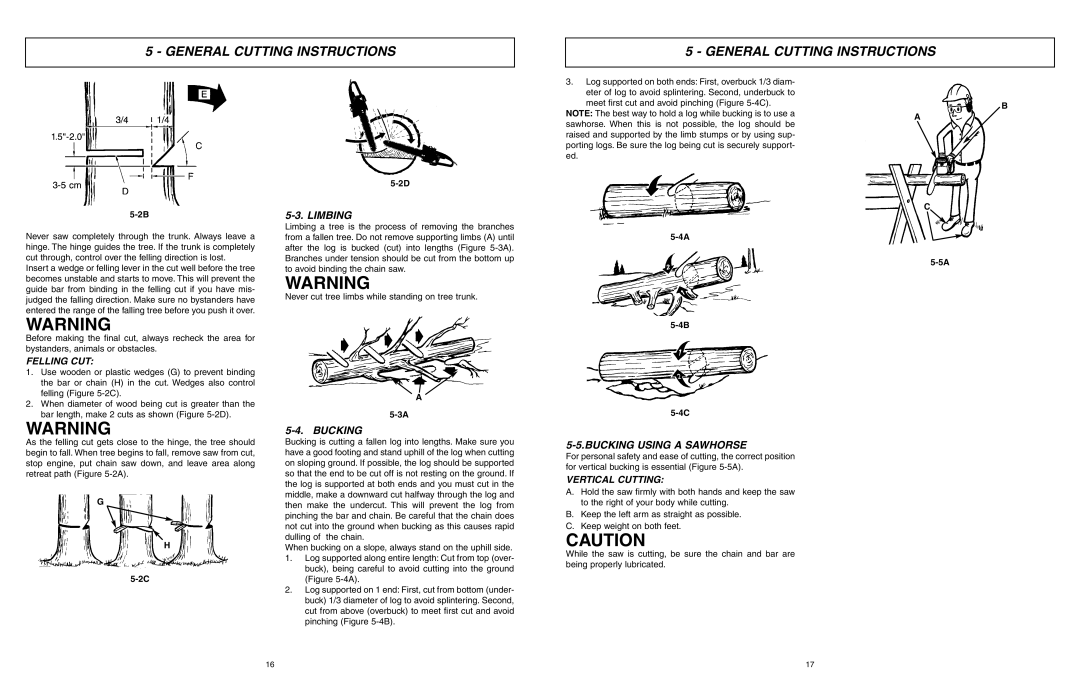
5 - GENERAL CUTTING INSTRUCTIONS
5 - GENERAL CUTTING INSTRUCTIONS
3.Log supported on both ends: First, overbuck 1/3 diam- eter of log to avoid splintering. Second, underbuck to meet first cut and avoid pinching (Figure
NOTE: The best way to hold a log while bucking is to use a sawhorse. When this is not possible, the log should be raised and supported by the limb stumps or by using sup- porting logs. Be sure the log being cut is securely support- ed.
B
A
Never saw completely through the trunk. Always leave a hinge. The hinge guides the tree. If the trunk is completely cut through, control over the felling direction is lost.
Insert a wedge or felling lever in the cut well before the tree becomes unstable and starts to move. This will prevent the guide bar from binding in the felling cut if you have mis- judged the falling direction. Make sure no bystanders have entered the range of the falling tree before you push it over.
WARNING
Before making the final cut, always recheck the area for bystanders, animals or obstacles.
FELLING CUT:
1.Use wooden or plastic wedges (G) to prevent binding the bar or chain (H) in the cut. Wedges also control felling (Figure
2.When diameter of wood being cut is greater than the bar length, make 2 cuts as shown (Figure
WARNING
As the felling cut gets close to the hinge, the tree should begin to fall. When tree begins to fall, remove saw from cut, stop engine, put chain saw down, and leave area along retreat path (Figure
G
H
5-3. LIMBING
Limbing a tree is the process of removing the branches from a fallen tree. Do not remove supporting limbs (A) until after the log is bucked (cut) into lengths (Figure
WARNING
Never cut tree limbs while standing on tree trunk.
A
5-4. BUCKING
Bucking is cutting a fallen log into lengths. Make sure you have a good footing and stand uphill of the log when cutting on sloping ground. If possible, the log should be supported so that the end to be cut off is not resting on the ground. If the log is supported at both ends and you must cut in the middle, make a downward cut halfway through the log and then make the undercut. This will prevent the log from pinching the bar and chain. Be careful that the chain does not cut into the ground when bucking as this causes rapid dulling of the chain.
When bucking on a slope, always stand on the uphill side.
1.Log supported along entire length: Cut from top (over- buck), being careful to avoid cutting into the ground (Figure
2.Log supported on 1 end: First, cut from bottom (under- buck) 1/3 diameter of log to avoid splintering. Second, cut from above (overbuck) to meet first cut and avoid pinching (Figure
5-5.BUCKING USING A SAWHORSE
For personal safety and ease of cutting, the correct position for vertical bucking is essential (Figure
VERTICAL CUTTING:
A.Hold the saw firmly with both hands and keep the saw to the right of your body while cutting.
B.Keep the left arm as straight as possible.
C.Keep weight on both feet.
CAUTION
While the saw is cutting, be sure the chain and bar are being properly lubricated.
C
16
17
